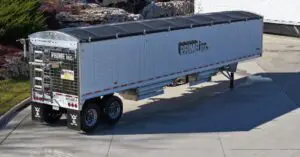Once you’ve earned your CDL and you’re ready to hit the road, you have an important decision to make. First, you’ll need to choose which type of trailer you’ll be hauling. There are several important distinctions between these types of semi trailers that may play into your choice of division.
We’ll go over some of the key features of refrigerated, flatbed and tanker trailers so you can decide which is best for you.
Refrigerated Division
Also known as reefers, these trailers are used to ship temperature-controlled freight like meat, dairy, medicines, alcohol, personal care products, and more.
Refrigerated trailers are a good choice for someone who likes consistent work, as there is always a need for more fresh products being transported across the country. Refrigerated trailers are also relatively low-maintenance in contrast to other kinds of trailers.
In order to be successful as a refrigerated truck driver, here are a few things to keep in mind:
- Complete a vehicle inspection prior to operating your tractor-trailer to ensure it is safe to operate.
- Check your refrigerated trailer to verify the temperature matches the bill of lading provided by the customer so that the goods are successfully maintained during transport.
- Always identify needs for temperature stability in terms of cargo.
- Monitor your shipment constantly to ensure it is staying fresh.
- Clean out the trailer after every load to avoid contamination.
- Treat every breakdown like an emergency issue because it is. Your entire load can be spoiled or ruined by being at an improper temperature for even a short period of time.
Flatbed Division
Flatbed trailers are for cargo that cannot be transported normally, like an inability to be transported in a dry van or being unable to fit in a standard trailer. Flatbeds may be used to haul equipment or heavy building material that cannot be transported otherwise.
If you’re someone who enjoys physical work and critical thinking, flatbed trucking could be a great fit for you. Assessing how to properly load your cargo in a way that is safe and efficient is a skill needed for this job. Flatbed trailers also offer flexibility in the cargo you carry because there are less dimensional limits than flatbed or tanker trailers.
When keeping themselves safe on the road, flatbed drivers should know a few things:
- Complete a vehicle inspection prior to operating your tractor-trailer to ensure it is safe to operate.
- Freight securement is crucial to hauling and delivering flatbed freight safely.
- You need to be constantly vigilant. As your cargo may affected due to being out in the open air; following all safety protocols is a must to keep things running properly.
- Be aware of the weather concerns that may come up and address them with your cargo. Will your cargo be ruined by the rain? If so, you may have to reevaluate your route or tarp your load.
- Be aware that flatbed drivers may have to secure loads in all weather conditions and plan properly with safety equipment and appropriate clothing.
Tanker Division
Tanker trailers are used to transport a variety of gases or liquids across the country, including food-grade products, petroleum, and various chemicals. Depending on the size of the trailer there are heavy duty, medium duty and light duty tanker trailers.
Tanker trailers are a good choice for someone who is detail-oriented and wants to push themselves in their career. Due to the requirements from the Occupational Safety and Health Administration (OSHA), tanker truck drivers typically make more than other kinds of over-the-road drivers. However, this does come with a set of responsibilities due to the nature of the cargo.
To excel as a tanker trailer driver, follow these tips:
- Complete a vehicle inspection prior to operating your tractor-trailer to ensure it is safe to operate.
- Be careful to know the legal weight limits regarding the liquids or gases you are using. There may be dense liquids or gases that may exceed this legal limit.
- Rollovers can be a more common issue with tanker trailers. Never exceed the speed limit, especially if weather conditions are poor. Always make sure you can maintain control of your truck and trailer at all times.
- Outside of road conditions, monitor the locations you’ll be driving. Roads may be risky or unfit to drive a tanker. Don’t risk it when it comes to your safety.
If you’re ready to embark on a truck driving career, sign up for Prime’s Truck Driver Training Program.
A recruiter will contact you shortly to discuss which type of semi trailer you’ve chosen and will help you build your career along the way.


